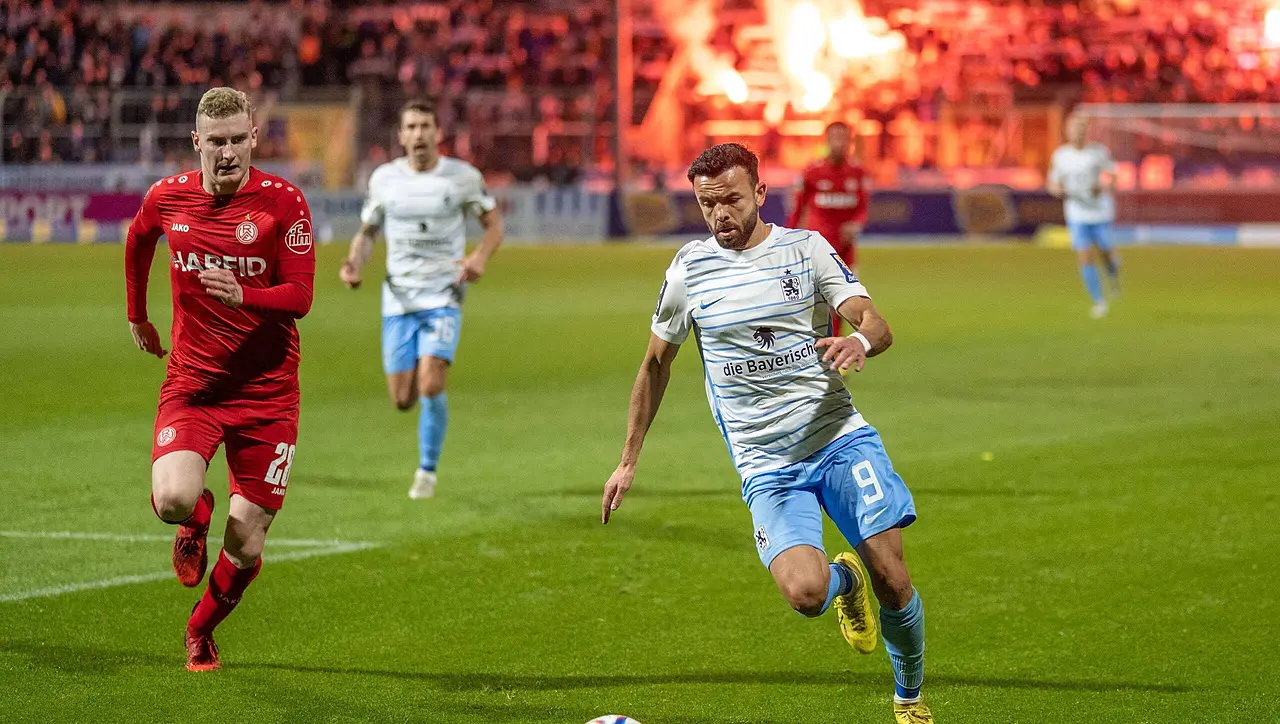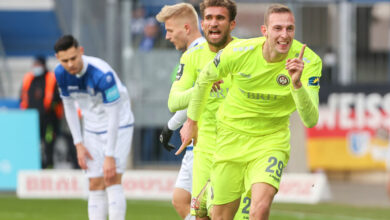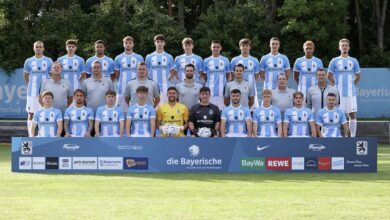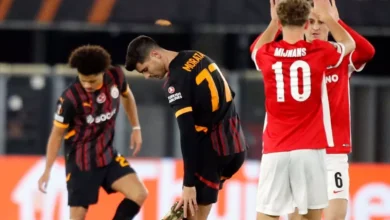RWE – 1860 München: A Clash of Traditions, Ambitions, and Footballing Spirit

Introduction
RWE – 1860 München in German football, fixtures between storied clubs often carry more than just three points—they bear weight in history, identity, and fan emotion. One such contest of interest is RWE – 1860 München, pitting Rot-Weiss Essen (commonly abbreviated as RWE) against TSV 1860 München. On the surface, it’s a match in the 3. Liga (the third tier of German football), but beneath that lies decades of tradition, ups and downs, regional pride, and structural shifts in German football. In this article, we’ll dive into the backgrounds of both clubs, their journeys to this point, head-to-head dynamics, the cultural and tactical narratives, and what the future might hold.
Club Histories: RWE and 1860 München
Rot-Weiss Essen (RWE) – A Tale of Resilience

RWE – 1860 München ,Rot-Weiss Essen, located in the Ruhr region, is a club steeped in local identity, industrial heritage, and the kind of fervent support that comes from being part of a working-class heartland. Historically, RWE had its heyday in the mid-20th century, with appearances in top divisions, and winning the DFB-Pokal in 1953. Over time, financial struggles and competition led to periods of decline, bankruptcy scares, and relegations. Yet the fanbase remained loyal, and the club has over recent years sought resurgence. Regional support and a strong emotional bond to the city help sustain the club in leaner times.
More recently, Rot-Weiss Essen has refocused on prudent financial management and local partnerships. While lacking the lofty budgets of some rivals, they rely heavily on youth development, local backing, and community engagement to push forward in the 3. Liga with hopes of climbing higher. The club’s narrative is one of rebuilding, of punching above its weight, and of maintaining identity in a footballing landscape dominated by bigger names.
TSV 1860 München – Glory, Decline, and Reinvention
On the other side, TSV 1860 München, often simply called 1860 München or Die Löwen (The Lions), is a club with a legacy in German football. Founded as a sports club in 1860 (with its football section emerging later), 1860 Munich reached great heights, winning the Bundesliga in 1966, reaching European competition, and contesting top-tier matches against giants like Bayern Munich and others.
RWE – 1860 München but like many historic clubs, 1860 München has also faced its turbulence. Financial issues, relegations, licensing problems, and stadium decisions have tested its identity. The club has vacillated between divisions, and more recently competes in the 3. Liga. Though the club has lost some of its former luster, it still commands a devoted fanbase and retains infrastructure and cultural capital many third-tier sides would envy.
The journey of 1860 München is one of reinvention RWE – 1860 München—seeking to preserve its heritage while adapting to the constraints of modern football economics. Its stadium choices, ownership structure, and long-term strategy reflect that balancing act.
The Matchup: Head to Head, Dynamics, and Recent Encounters
Historical Head-to-Head Record
When you look at the history between Rot-Weiss Essen and 1860 München, the numbers suggest a fairly balanced rivalry with slight advantages for 1860 München. According to head-to-head data, out of 11 matches since 2004, 1860 München has claimed 5 victories, RWE just 1, and 5 ended in draws.In terms of goals, the Lions have scored 15 in these matchups, while Essen has tallied 7. It’s not a rivalry with deeply entrenched animosity, but one where both clubs know each other competitively, and matches tend to be hard-fought.
Interestingly, home advantage seems to play a role: when the match is in Essen, RWE have historically performed slightly better; when in Munich (or neutral settings), 1860 often carries the edge. These data points underline that while numbers tilt toward Munich, RWE are capable of springing surprises.
Recent Tiers & 3. Liga Context
Both clubs now operate in Germany’s 3. Liga, and that fact imbues their matches with heightened stakes. For RWE – 1860 München the objective often revolves around promotion ambitions or at least stabilizing in a league they feel is below their historic standing. For RWE, the challenge is to climb upward and reassert themselves in a footballing ecosystem dominated by wealthier clubs.
Take the August 1, 2025 fixture: it ended in a 1–1 draw. RWE – 1860 München,RWE took the lead early through José-Enrique Ríos Alonso (6′), and 1860 equalized via Florian Niederlechner (68′). That match demonstrated more than just the scoreline—it showed how evenly matched the sides can be at times and how momentum swings matter in these tiers.
Another recent result: in the 2024–25 season, 1860 München won their midseason clash 2–0 under new coaching, staying unbeaten in several matches under that regime. That kind of form is vital in a league where consistency often determines promotion or relegation.
Tactical and Psychological Battles
RWE – 1860 München ,when RWE and 1860 München face each other, there’s a psychological undercurrent: the underdog mindset for Essen, and the pressure of expectation for Munich. The match-ups often become about structure, pace, and seizing moments rather than open, free-flowing football.
Tactically, RWE tends to deploy compact lines, direct transitions, and try to strike on counters. They know they often will not dominate possession, so minimizing mistakes and capitalizing on set pieces or breakdowns is critical. Meanwhile, 1860 München often tries to assert their more polished passing play, maintain control in midfield, and force the opposition to chase the game.
Given that matches are rarely high-scoring, emotional control, substitutions, and in-game adjustments become crucial. Coaches on both sides need to read shifts in momentum and respond. Over time, players accustomed to these high-stakes matches develop familiarity with how the other side reacts—giving such fixtures a chess-match feel rather than a purely athletic contest.
Cultural, Fan, and Stadia Perspectives
Fans, Identity & Regional Pride
One of the most magnetic aspects of RWE – 1860 München is the support base. Essen, in the Ruhrgebiet, has a gritty, industrial football culture. Its fans are used to hardship, loyalty, and highs and lows. The emotional investments are deep: victories mean more than points; they are affirmations of identity.
Munich’s fans, especially for 1860, carry a sense of historical pride and a feeling of being overshadowed by their city rivals, Bayern Munich. That dynamic adds emotional depth: succeeding in games like these is a way to reclaim relevance, to remind people they aren’t just the underdog in their own city.
When the two fanbases meet, there’s mutual respect, but also a strong desire to assert dominance. Away support travels, nerves tighten, and the matchday atmosphere plays a part in how both sides perform. In smaller stadiums like Grünwalder Stadion (capacity ~15,000), the closeness of fans to the pitch can intensify the feeling.
Stadiums & Home Advantage
RWE’s home ground, Stadion Essen, gives them the comfort of familiarity and crowd backing. Though not massive, it can become an intimidating fortress in the right circumstances.
RWE – 1860 München ,1860 München’s home venue is the Grünwalder Stadion (also called Sechzgerstadion) in Munich. It has a storied past, once hosting large crowds (e.g. 58,560 in 1948 for 1860 vs Nürnberg), though now its capacity is more modest. The stadium brings a nostalgic feel, with its steep terraces and tradition-rich aura. It’s not a modern bowl, but its atmosphere can be electric. Importantly, because it does not meet all requirements for higher divisions (e.g. 2. Bundesliga) in some configurations, promotion for 1860 may require considerations about future stadium plans.
Home advantage in matches like RWE vs 1860 can tilt tight games. Crowd support, pitch familiarity, and travel fatigue for the away team all come into play.
Challenges, Opportunities & the Road Ahead
Financial Realities & Structural Constraints
Neither club enjoys the unrestricted financial muscle of top-tier sides. Budgets in 3. Liga are constrained, and infrastructure costs, player wages, and stadium maintenance eat into resources quickly. For RWE, balancing ambition with sustainability is critical. For 1860, the challenge is reconciling its history with the limitations of the present.
Licensing is another concern. Clubs in Germany must meet financial, stadium, youth development, and administrative criteria to participate — falling short can mean relegation or exclusion despite sporting success.
Player Recruitment & Development
To bridge gaps, both clubs must rely on shrewd recruitment and youth development. Scouting undervalued talent, nurturing academies, and integrating young players into the first team are pathways to long-term competitiveness without overspending.
1860 München has the advantage of reputation and infrastructure, possibly attracting prospects who see a stepping stone. But RWE, too, can appeal to those wanting more playing time or a chance to prove themselves.
Maintaining a balance between experienced players (who bring stability) and young talent (who bring energy and future value) is a delicate art. Teams that fail to calibrate that balance tend to either stagnate or collapse under financial stress.
Pursuit of Promotion & Managing Expectations
For 1860 München, the aim is often to return to the 2. Bundesliga or beyond. That requires season-long consistency, handling pressure matches (like versus RWE), and making smart mid-season adjustments. A slip in momentum or injury crisis can derail the campaign.
For RWE, the goal might be incremental: aiming for top-half finishes, establishing a stable 3. Liga presence, and pushing for promotion when conditions allow. Overreaching too early can lead to financial and sporting setbacks.
In matches against fellow contenders like 1860, there’s also a “six-pointer” effect: the psychological and points value is magnified. Winning such games can shift momentum, public perception, and even sponsorship interest.
Case Study: August 2025 Match & What It Reveals
Let’s revisit the August 1, 2025 fixture.
- RWE struck early via Ríos Alonso in minute 6.
- 1860 responded in the 68th minute with Niederlechner’s goal.
- The match remained balanced, with neither side dominating fully.
What this match highlights:
- Early statements matter — RWE didn’t wait to play defensively; they attacked early to seize momentum.
- Adaptability of Munich — 1860 didn’t panic; they steadily pressed, found chances, and converted.
- Margins matter — a draw feels like a safe outcome in such fixtures, but both sides would reflect on missed chances or tactical tweaks.
These tight results are emblematic of the RWE vs 1860 match-up: evenly matched squads, high tension, and small decisions often deciding outcomes.
Why “RWE – 1860 München” Matters Beyond the Scoreline
- Historical resonance — For fans and local communities, these matches echo decades of regional pride and footballing memory.
- Competitive barometer — How a club performs against teams of similar standing can indicate whether they’re ready to push forward or need rebuilding.
- Talent showcase — Matches attract more attention, putting players in the spotlight, perhaps opening paths to transfers upward.
- Fan engagement & identity — These fixtures galvanize supporters, bring media interest, and help define a club’s narrative for the season.
Concluding Thoughts & Outlook
RWE – 1860 München is more than just another 3. Liga fixture. It’s about legacies, ambitions, and the enduring romance of football where underdogs and historic institutions collide. If both clubs steer well—balancing finances, recruiting wisely, and maintaining consistency—these matches can become springboards to greater heights.
RWE – 1860 München, the dream is to build sustainably, nurture local talent, and gradually challenge upward. For 1860 München, the task is to convert legacy into current success, to rebuild momentum, and to climb back into the upper tiers.
In coming seasons, watching how these clubs evolve will be fascinating. Will RWE surprise many and ascend? Will 1860 reclaim a place closer to their former glory? And in their head-to-head battles, who will assert dominance?
Football lovers, especially those who cherish the stories behind the stats, should keep an eye on RWE vs 1860 München — it’s a narrative in motion, full of promise, tension, and the kind of drama that reminds us why we love the sport.



